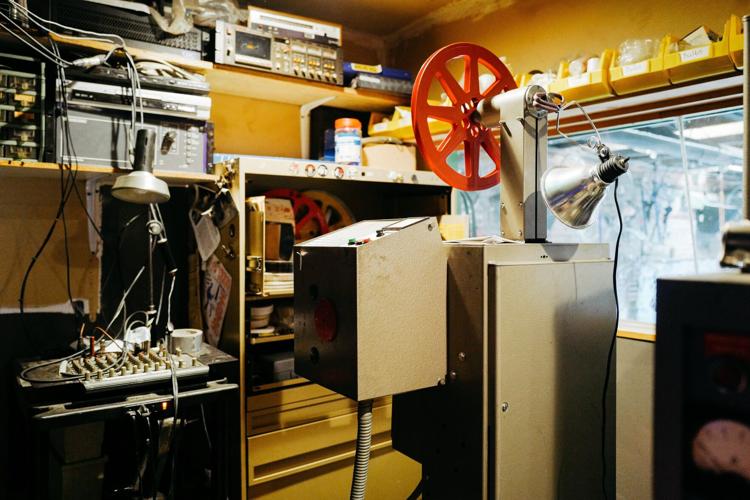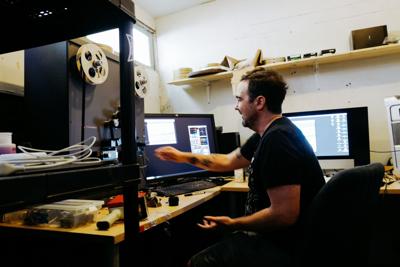╬┌č╗┤½├ĮŌĆÖs many cinemas can be entered in all kinds of ways ŌĆö by walking through the street-facing facades of the Revue and the Fox, by riding the long escalators up to the Scotiabank Theatre, or by parking next to the Queensway Cineplex in Etobicoke.
But for CineCycle one must walk down an unmarked laneway off Spadina Avenue, just south of Richmond Street, and through weathered green doors hand-painted with the sign ŌĆ£CINE CYCLE WORK TO RULE.ŌĆØ
Inside the Victorian-era coach house behind 401 Richmond, exposed brick walls are lined with film paraphernalia, old projectors and a mess of vintage bicycle frames and wheels. Overhead, pipes and cables criss-cross the ceiling, adding to the spaceŌĆÖs rough-hewn, mechanical charm. Stacked chairs for up to 70 attendees flank a large screen, while movie and cycling posters, and relics of past programs, lend the room a sense of layered history ŌĆö part garage, part underground cinema, wholly unique in ╬┌č╗┤½├ĮŌĆÖs movie-going landscape.

For years, the CineCycle coach house has been an important hub for ╬┌č╗┤½├Į’s indie film scene.
Michelle Mengsu Chang ╬┌č╗┤½├Į StarIn 2024, CineCycle┬ĀŌĆö for decades one of the city’s most important hubs for underground, experimental and alternative film┬ĀŌĆö faced eviction. Thanks to a partnership with another crucial film institution, the Canadian Film and Media Distribution Centre (CFMDC), it lives to screen another day.
Martin Heath founded CineCycle in 1991. An almost Dickensian character with two loves ŌĆö cinema and the Tour de France ŌĆö he has both nurtured the venue and fought for its survival since it opened. Originally from Leeds, U.K., Heath said his cinematic epiphany was seeing Polish filmmaker Andzrej WajdaŌĆÖs 1958 drama ŌĆ£Ashes and DiamondsŌĆØ on television. ŌĆ£I joined the local film society, and soon after moved to London, where I was doing mobile film projection services,ŌĆØ Heath told the Star while cleaning CineCycleŌĆÖs projection booth one recent afternoon.
With a massive film collection as cargo, Heath emigrated to Canada in 1972, where he edited his only film, ŌĆ£Son of Tutti Frutti,ŌĆØ which he also co-directed. A rapid-fire rock ŌĆÖnŌĆÖ roll montage of juxtaposed pop-culture imagery, it featured everyone from Bugs Bunny to ŌĆÖ50s sex symbol Mamie Van Doren, and caught the eye of promoter Gary Topp, who booked it at the Original 99┬ó Roxy on the Danforth. ŌĆ£IŌĆÖd never seen anything like it,” Topp told the Star, “a hodgepodge of historical bootlegged film clips, crudely edited and barely intact on the reel.ŌĆØ
It became a regular midnight attraction alongside ŌĆ£Pink FlamingosŌĆØ and ŌĆ£El Topo.ŌĆØ In ╬┌č╗┤½├Į Heath found a vibrant film community. ŌĆ£There was a good independent scene,ŌĆØ he said, citing Cinecity, a theatre at Yonge and Charles that was among the first in ╬┌č╗┤½├Į to present the works of avant-garde filmmakers like Kenneth Anger.

CineCycle’s Martin Heath co-directed “Son of Tutti Frutti,” which played in ╬┌č╗┤½├Į in 1973.
John PearsonBut making movies was never HeathŌĆÖs priority. His focus was on projecting them (he created a bicycle-powered film projector) and ensuring that artists had access to an affordable, independently funded space to show their work.
By day, Heath would repair bicycles and serve cappuccinos to cyclists and the film community. By night, the projectors flickered, as Heath hosted small festivals and film societies, or screened prints from his vast collection. The booth could project 35 mm, 16 mm, 8 mm, even 28 mm, an obscure gauge favoured by home movie enthusiasts during cinemaŌĆÖs first decades. Over the years, it has served as gig space for ╬┌č╗┤½├ĮŌĆÖs punk and hardcore music scenes.
As condos grew in the burgeoning club district, so did the noise complaints. Bylaw inspection visits to CineCycle became frequent, and years of fraught relationships with the owners of 401 ensued.
To save a space
Last summer, 401 Richmond sent CineCycle a notice of eviction. Filmmaker John Greyson was among the first people Heath called upon receiving it.
ŌĆ£We mobilized a Zoom,ŌĆØ Greyson said, ŌĆ£and from there it was just outreach to the community of people who’d already been part of CineCycle.ŌĆØ Greyson called on long-time friends and supporters of HeathŌĆÖs like filmmakers and scholars John Porter, Philip Hoffman and Janine Marchessault. Film programmer and arts administrator Scott Miller-Berry was instrumental in involving the CFMDC, added Greyson, who first met Heath in the early 1980s.
Serendipitously, the CFMDC, which had previously occupied a space at 401, sought to return, because their subsequent location, next to a band rehearsal space, wasnŌĆÖt conducive to film screenings. CFMDC leased new office space at 401 Richmond, and in the process, leased the coach house for CineCycle, merging two important Canadian film institutions.
But guaranteeing CineCycleŌĆÖs survival didnŌĆÖt come easily. A committee of more than 20 filmmakers, programmers and arts administrators met weekly for nearly a year to oversee an agreement with 401ŌĆÖs administration that would allow CineCycle to remain in the space under the auspices of the CFMDC.
Some were on board with the plan from the start, others suspicious, calling it “the institutionalization” of CineCycle, which had always run independently, free of government funding.
ŌĆ£As discussions became positive with the building,ŌĆØ said Miller-Berry, who runs Workman Arts, an arts and mental health organization, ŌĆ£it didnŌĆÖt take long to realize that the goal was to save the space for the benefit of everyone ŌĆö for filmmakers, for film lovers, for film festivals.ŌĆØ
CineCycle was HeathŌĆÖs home: every upgrade, from the projection booth to the bathroom and the venueŌĆÖs rarely functioning air conditioning, was his handiwork. The agreement also included necessary upgrades to the coach house, which are in the works.
The coach house had long been an affordable rental alternative to larger, more expensive theatres like TIFF Lightbox and Hot Docs. Milada Kovacova, co-chair of the committee, said CineCycle provides a ŌĆ£venue for many small media arts festivals with limited resources. ╬┌č╗┤½├Į needs more screening spaces, not less.ŌĆØ

The projector room at CineCycle is being outfitted to handle digital screenings.
Michelle Mengsu Chang ╬┌č╗┤½├Į StarMost importantly, everyone wanted to assure that the 80-year-old Heath could remain as head projectionist, earn wages and access proper housing ŌĆö an initiative credited to Lisa Steele and Kim Tomczak of VTape, a video art organization also at 401 Richmond.
As part of these changes, Niagara Custom Labs, one of CanadaŌĆÖs only remaining film-development laboratories, now uses the back room ŌĆö HeathŌĆÖs former sleeping quarters ŌĆö as an office and film drop-off point.
Heath said he is adjusting to these developments: ŌĆ£ItŌĆÖs difficult to keep up. ThereŌĆÖs a lot of stuff in the basement (of 401) that has to be sorted. And the CFMDC wants to streamline the booth. It has made things more complicated.ŌĆØ
Edward Sharpe, senior technical manager at CFMDC, is overseeing the projection boothŌĆÖs digital transformation, while also ensuring that HeathŌĆÖs projectors remain intact for both CFMDC and CineCycleŌĆÖs legacy clients, like the cult-film program Trash Palace.

The screening area at CineCycle can accommodate around 70 guests.
Michelle Mengsu Chang ╬┌č╗┤½├Į StarThe CFMDC also meet weekly with Heath to discuss upcoming events and new procedures. Heath arrives daily at 2 p.m., tuning up bikes and running projection for analog screenings. Bookings have ramped up, but it has been a long process.
In 2019, CineCycleŌĆÖs reputation was blemished after a telephone exchange between Heath and Nashville-based artist Taja Nicholle, in which Heath made insulting remarks about a Black mental-health event proposal. Community members, including Greyson and Marchessault, began a mediation process that inspired slow, ongoing efforts toward accountability through the venueŌĆÖs programming.
Genne Speers, executive director of the CFMDC, said that accountability was paramount with this new partnership, and that inclusivity is a top priority. ŌĆ£ItŌĆÖs important that everyone knows that CineCycle is open and accessible to everyone,ŌĆØ she said. ŌĆ£Films about Palestine, queer films ŌĆö CineCycle is here.ŌĆØ
New audiences are discovering the space. The ╬┌č╗┤½├Į Fringe Festival rented CineCycle for a production earlier this month.
The future of underground film
Since 1967, CFMDC has championed independent, artist-made film and video, with a focus on under-represented voices, artists rights and fair compensation. Its collection includes the works of key Canadian figures like Michael Snow and Joyce Wieland.

Film cans line the shelves at the main office of the CFMDC.┬Ā
Michelle Mengsu Chang ╬┌č╗┤½├Į StarRennie Taylor, a ╬┌č╗┤½├Į filmmaker whose work was recently added to the CFMDCŌĆÖs distribution catalogue, grew up immersed in the cityŌĆÖs experimental film scene. His father, Tom Taylor, ran Pleasure Dome, one of ╬┌č╗┤½├ĮŌĆÖs longest-running film societies. Frequent childhood visits to 401 Richmond and CineCycle, he said, played a formative role in his development as a filmmaker.
As a child, Taylor was gifted a zoetrope ŌĆö an early animation device that displays a moving image through slits in a rotating cylinder ŌĆö by Heath. ŌĆ£I didn’t really think much of it at the time,ŌĆØ he said, ŌĆ£but reflecting back, that little gesture, was later very important.ŌĆØ
For Taylor, CineCycle is ŌĆ£such a critical resourceŌĆØ ŌĆö a rare space for alternative media in a city where such venues have vanished. ŌĆ£There arenŌĆÖt any spaces like CineCycle,ŌĆØ he said, noting its longevity compared to earlier hubs like The Funnel underground film collective.
Taylor, who hopes the renewed activity around CineCycle will inspire younger generations, has organized an open screening of Super 8 films at the venue for July 27.
Filmmaker Derek Jenkins, who serves as chair of CFMDC, echoes TaylorŌĆÖs sentiments. ŌĆ£Part of the mission is ensuring that everything is set up to guarantee that CineCycle will still be around in 20 years,ŌĆØ he said, ŌĆ£that long after IŌĆÖve stepped down as chair, I can visit, and see a new, young projectionist in the booth, and a whole new generation of filmmakers showing their work.ŌĆØ




































To join the conversation set a first and last name in your user profile.
Sign in or register for free to join the Conversation